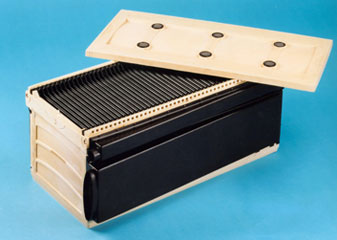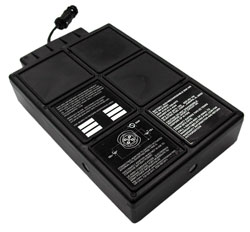This project is no longer active.
Incorporated in 1990, Electric Fuel has produced everything from massive (1.5 ton) fuel cells for electric vehicles, to emergency cellphone batteries weighing less than three ounces.

1990
EF Invents Novel Zinc-Air Storage Concept for Solar Energy

1999 – 2003
Worldwide Zinc-Air Solutions for Electric Vehicles
Tens of thousands of kilometers of on-road EV success – in subcompact cars to 4.8 ton delivery vans – have demonstrated that Electric Fuel’s revolutionary zinc-air fuel cell, which uses commercially-available, low cost zinc, is a robust solution for zero-emission transportation.
In the USA:
- Successful demonstration of full-size, all-electric, zero-emission passenger bus
- Specific energy of 200 Wh/kg
- Eight-hour continuous service
- Record-breaking range under fully-loaded city driving conditions
- Rapid anode exchange; freedom from “plug-in-and-wait” recharge
- Operating costs comparable to standard diesel buses
In Germany:
- Electric Fuel’s zinc-air batteries served as primary energy source for hybrid cargo vans driving more that 60,000 km in all weather field testing for the German Postal Authority
- Vehicles serviced at the Electric Fuel regeneration plant in Bremen
In Italy:
- Electric Fuel EV technology installed in subcompact cars and large vans
- Establishment of EF anode regeneration plant
In the Netherlands:
- Passenger van equipped with EF zinc-air batteries demonstrated
In Scandinavia
- License agreement to establish and operate Electric Fuel infrastructure signed for Sweden, Denmark, Norway, Finland and Petersburg, Russia
Electric Fuel is a member of TEPS – an Israeli industrial-academic consortium working together to advance EV technologies.

2001
Zinc-Air Applied to Hand-Held Devices
- Mission-specific chargers and batteries
- World’s first power bank for charging multiple cellphones, video cameras & personal digital assistants.

2003 – 2019
Zinc-Air Batteries and Chargers for the Military
- Powerful, lightweight solutions for soldiers on the move
- Batteries for UAV and MAV platforms
- High capacity for long missions
- Specific energy of up to 400 Wh/kg
- Stable even under direct fire
- Tens of thousands of units used by US forces in Iraq

